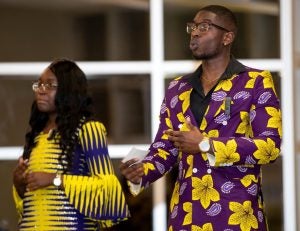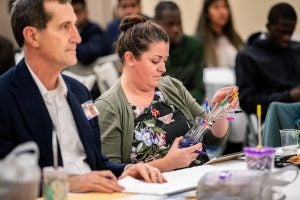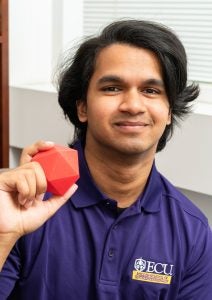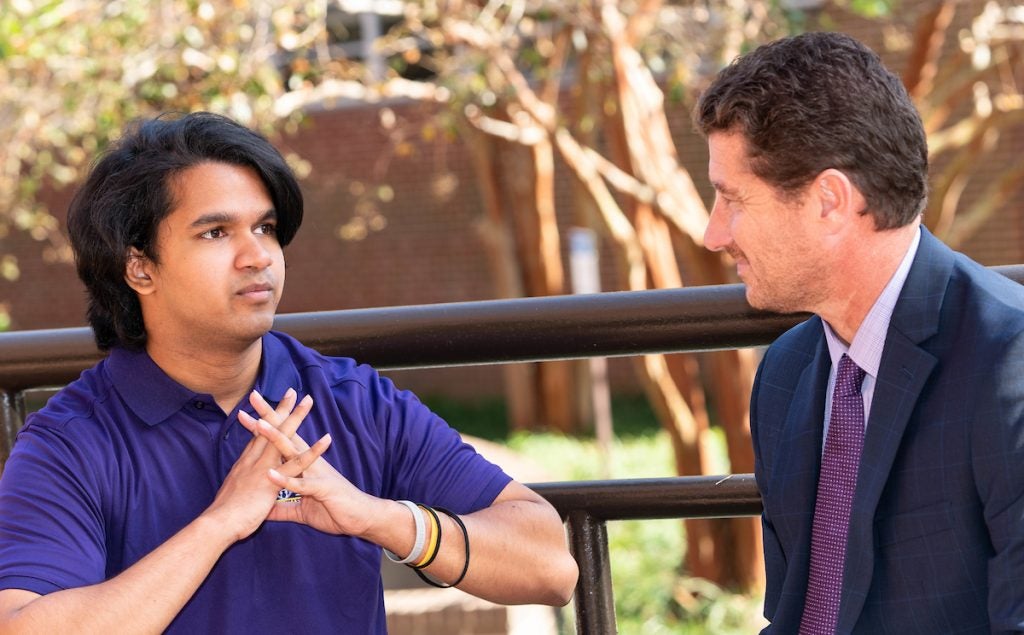May 23, 2019
Opportunity Knocks
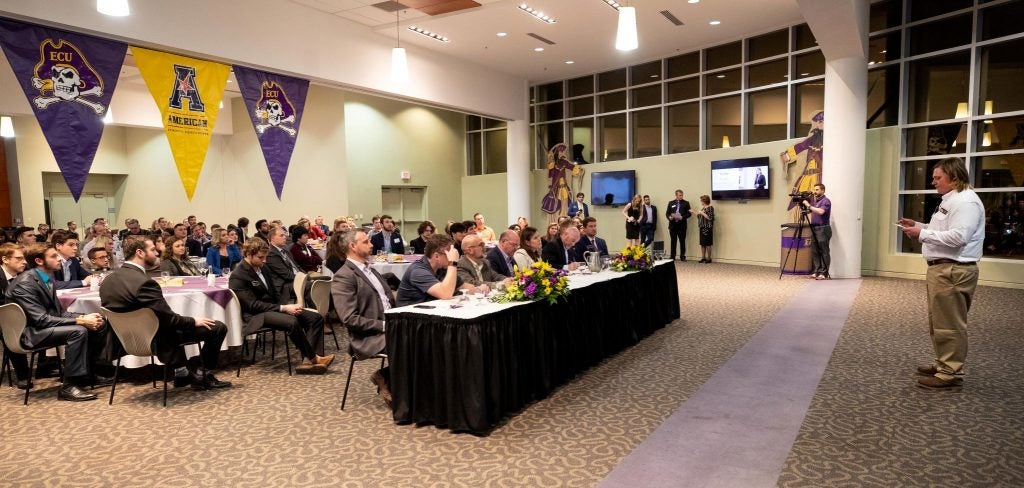
Business student Hunter Graves pitches his mosquito-control product, InvisaBarrier, at the 2019 Pirate Entrepreneurship Challenge.
Student entrepreneurs put their ideas to work
This story originally ran in the East Magazine Spring 2019 issue
By Michael Rudd
For Taylor Hicks, what started as a hobby, a creative outlet to practice calligraphy, has now morphed into a business with more than $250,000 in sales in 2018.
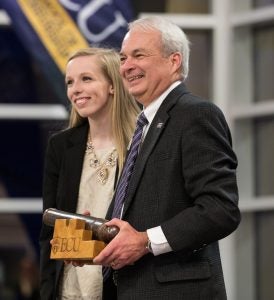
Taylor Hicks poses with then-Dean Stan Eakins at the College of Business’ 2018 Pirate Entrepreneurship Challenge, which she won. In March, she cut the ribbon on a 2,300-square-foot retail space in Greenville.
Hicks, a senior in the ECU College of Business, owns Simple & Sentimental. The company started in 2016 in her dorm room when she was a freshman majoring in interior design. She would use her calligraphy skills to create bookmarks that she left in a basket outside her room for other students to use. Soon, requests started coming in for personalized Christmas gifts.
Her first step as a business owner came in two facets: She bought a die-cutting machine to create personalized vinyl stickers, and she posted her products on the e-commerce website Etsy. She was doing all this in her dorm room.
In 2017, she created and sold bridesmaid boxes that contained a wineglass and a personalized note. That summer, she made $9,000; she made $58,000 for the entire year.
“I then realized you can still be creative and run a business,” said Hicks.
Encouraging ingenuity
As Simple & Sentimental was taking shape, the College of Business and its Miller School of Entrepreneurship were planning to launch their flagship entrepreneurial competition, the Pirate Entrepreneurship Challenge.

Grace Krell pitches her company, SweetSip, during 2019 finals of the Pirate Entrepreneurship Challenge.
Established in 2015, the Miller School serves as a regional hub for preparing students to take an entrepreneurial mindset and skill set into their communities. It’s made a concerted effort to develop programs that encourage students to express their creative ideas and test the waters to see if those same ideas have marketability.
The Pirate Entrepreneurship Challenge is designed to do just that.
The first round is an open-air format in which ECU students pitch their ideas to the ECU community who will vote for teams to move onto the second round. There, 12-15 teams pitch their ideas to judges. Second-round winners are then assigned mentors – community entrepreneurs and ECU faculty and staff who will consult with them to pitch their product to another panel of judges during the final round. It’s here the competitors must demonstrate a clear market need for their ideas.
Hicks won the first Pirate Entrepreneurship Challenge in 2017-2018 and walked away with $12,500, money she used to procure Greenville office space.
“Let’s face it. Any entrepreneurial spirit has its start in creativity,” said Mike Harris, director of the Miller School. “But that’s only part of a solution. For creativity to drive impact, the execution has to happen. That’s what Taylor has been able to accomplish.”
And it’s been some impact. For 2019, Hicks said she’s on track to reach almost half a million dollars in sales.
- Business students Mariama Ibrahim and Robert Ola pitch his clothing brand, Ola Customs LLC, at the challenge.
- John Ciannamea of SEED@ECU and Arianna Billingsley of the Small Business Technology and Development Center look at student Grace Krell’s SweetSip at an early round of the most recent challenge. SweetSip took second place overall in this year’s event.
From idea to reality
To date, more than 150 student teams have participated in the challenge representing more than 10 ECU colleges. As Harris puts it, the challenge is part of an entrepreneurial ecosystem that recruits and nurtures ideas and depends on ECU resources, faculty and students, local institutions and governments, entrepreneurs, alumni, community colleges and the local high school system. The Miller School is helping drive this system to give students opportunities to develop and articulate their creative ideas.
Another entrepreneurial program, I-Corps@ECU, is funded by a $500,000 grant from the National Science Foundation. Using proven methods in lean launch, customer discovery and business model innovation, I-Corps@ECU allows innovators to assess and validate their ideas in a safe-harbor environment mentored by entrepreneurs and key stakeholders. The program is making strong strides. Since last fall, 52 teams comprising 100 people have gone through the program. Those that have advanced beyond the ideation phase have succeeded in raising $300,000 in capital.
Marti Van Scott is the director of commercialization and licensing with ECU’s Office of Innovation and New Ventures. She says I-Corps@ECU helps students, educators and researchers to understand their ideas could have value outside of the classroom or laboratory by generating products with potential to serve an unmet need in the community and beyond.
“We’re very happy that we’ve been able to use I-Corps@ECU to help tease ideas out of their heads,” said Van Scott. “Our interconnected ecosystem has supported diverse projects that have made amazing progress.”
Magus Pereira, a recent ECU computer science grad, worked with I-Corps@ECU and other resources at the Office of Innovation and New Ventures. He also participated in the Pirate Entrepreneurship Challenge and additional pitch competitions, gained feedback from Miller School advisory boards and participated with several student organizations.
In 2018, Pereira’s idea, called Project Owl, was one of 2,500 pitched during the inaugural Call for Code Challenge, co-founded by IBM. Project OWL is a two-part hardware/software solution that provides a communication infrastructure that gives first responders a simple way of managing all aspects of a disaster.
Pereira and his teammates pitched Project Owl to competition judges, including former President Bill Clinton and Jim Zemlin, executive director of the Linux Foundation. The idea took first place and won $200,000 in cash, product development by IBM and the opportunity to pitch OWL to a venture capitalist firm for potential funding.
“Many of the ideas that arise from entrepreneurs result from trying to find solutions to unmet needs,” said Harris. “If the problems had an easy solution, the need would already be met.”

